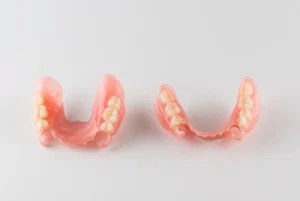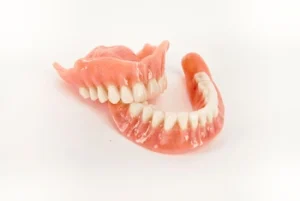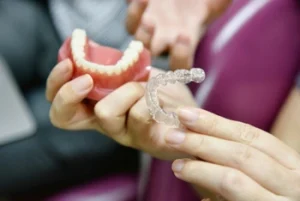Denture adhesives play a useful role for many denture wearers adjusting to dentures, but cleaning them off properly is just as important. If not removed thoroughly, the residual adhesive can build up on your gums or prosthetics and affect comfort. Improper removal may even lead to gum irritation, poor denture fit, or reduced oral hygiene. Learning how to remove denture adhesive the right way helps protect both your mouth and your dentures.
This guide walks through practical, safe methods to remove adhesive while keeping your oral tissues healthy and free of irritation.
Understand the Different Forms of Denture Adhesives
Knowing the type of adhesive you’re using helps determine the most effective cleaning method. Adhesives come in various forms that behave differently during removal.
 Common Adhesive Types Found in the Market
Common Adhesive Types Found in the Market
Denture adhesives are available in pastes, powders, pads, and strips. Each type creates a different level of grip between the denture and gum tissue. Pastes and creams often leave more adhesive residue compared to powders or strips, which tend to dissolve faster with moisture.
Why Adhesive Choice Affects Removal
Some forms are more water-soluble and easier to rinse away. Others may leave behind thicker adhesive remains that require gentle physical removal. Understanding how much adhesive is needed and how it behaves throughout the day reduces overuse and simplifies nightly denture care.
Daily Rinsing Practices That Loosen Adhesive
Basic rinsing can go a long way in softening adhesive before removal. These simple steps should be part of your daily care.
Use Warm Water Rinse for Effective Softening
Rinsing your mouth with warm water helps loosen the adhesive from your gums and denture surface. Repeat several times to soften the hold. A warm water rinse can also soothe the oral tissues after a full day of wear.
Try a Saline Solution to Help Break Down Adhesive
Mix half a teaspoon of salt into a glass of warm water and swish gently around your mouth. The saline solution helps dissolve adhesive residues while promoting oral health. It’s a good option if you’re removing denture adhesives after longer wear periods.
Safe Techniques for Removing Adhesive from Gums
Gums can be sensitive, especially after long denture wear. Using the wrong tools or motions may irritate the surface or cause injury.
Gentle Cleaning With the Right Tools
Always use a soft-bristled toothbrush to remove adhesive from your gums. Brush gently in circular motions to avoid scraping. A soft brush is enough to lift adhesive while being kind to the tissue.
Use a Rocking Motion for Denture Removal
To remove dentures comfortably, use a slow rocking motion rather than forceful pulling. This technique helps release the seal without causing stress on your gums or jaw. Once free, check both the denture and your gums for any adhesive that needs further cleaning.
Cleaning Dentures After Removal
Once dentures are out, proper cleaning ensures that no adhesive or residue lingers on the surface or fitting area.
 Start With a Thorough Rinse and Brush
Start With a Thorough Rinse and Brush
Rinse the denture under running warm water immediately after removal. Use a denture cleaner and a soft brush to scrub off any adhesive from your gums or from the denture surface. Pay special attention to the denture fitting surface where adhesive tends to cling.
Choosing the Right Denture Cleaner
Denture cleaners come in various formulas designed to lift adhesive without damaging acrylic dentures. Some tablets dissolve completely in warm water and help break down adhesive layers. Always ensure the adhesive is completely dissolved before rinsing the dentures again.
Troubleshooting Adhesive Issues and Reconsidering Fit
Frequent adhesive use may signal a deeper issue with fit or function. Ill-fitting dentures often lead to overuse of denture glue.
Adhesive Use Should Not Mask Poor Fit
Using denture glue as a permanent solution for loose dentures is not ideal. If adhesives are required daily for a secure fit, your dentures may need an adjustment or replacement. Relying on adhesives for a temporary fix may create longer-term oral issues.
Seek Advice for Persistent Fit Problems
Visit a prosthetist at your clinic to review your current dentures. Poor denture hygiene or denture age can affect suction and comfort. Well-fitting dentures reduce the need for adhesives and lower the risk of gum irritation or fungal infections.
When New Dentures or Adjustments Are Needed
Some cases require more than better cleaning habits. Addressing the root cause may help prevent continued adhesive dependence.
Recognising When It’s Time for a Change
If you experience a sore mouth or frequent adhesive issues, new dentures may be required. Bone loss over time alters how dentures sit on your gums and jaw. A prosthetist can assess your mouth and recommend a permanent solution, especially if your dentures are more than five years old.
Consider Alternatives to Adhesive Use
Depending on your case, switching to different materials or getting your dentures relined could reduce the need for adhesives. In more complex cases, adjusting the bite or exploring other retention methods may support better long-term comfort.
The Role of Proper Adhesive Use in Overall Oral Health
Adhesives can help with temporary relief, but using them correctly and sparingly ensures your mouth stays healthy.
Use Only a Small Amount
Apply a small amount of adhesive and avoid overuse, which leads to excessive residue. Using more adhesive than required often creates build-up on the denture surface or along the gums. Stick to the recommended amount provided with the product instructions.
 Be Mindful of Oral Hygiene
Be Mindful of Oral Hygiene
Removing denture adhesive properly should be part of your daily denture care routine. Clean dentures, rinse the mouth and inspect oral tissues regularly. Keeping adhesive residue away from your mouth supports good oral hygiene and keeps your gums in better shape.
Don’t Let Adhesive Build-Up Get in Your Way
Cleaning off adhesive doesn’t have to be complicated or uncomfortable. With the right tools, consistent habits, and a bit of gentle technique, removing denture adhesive can be quick and effective. If your dentures feel loose or you find yourself relying on adhesive daily, it’s time for a professional review. Visit our clinic to get a personalised fitting and advice tailored to your needs. Call us today on (07) 5317 1023 or (07) 5315 8076 to book your appointment.
References
https://www.fda.gov/medical-devices/dental-devices/denture-adhesives
https://www.dentalhealth.org/dentureadhesives


 Common Adhesive Types Found in the Market
Common Adhesive Types Found in the Market Start With a Thorough Rinse and Brush
Start With a Thorough Rinse and Brush Be Mindful of Oral Hygiene
Be Mindful of Oral Hygiene


Recent Comments